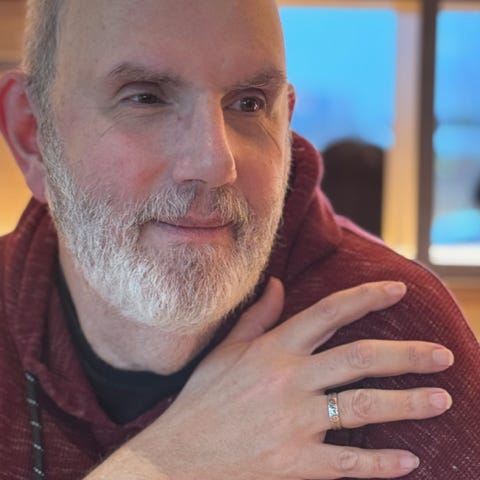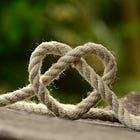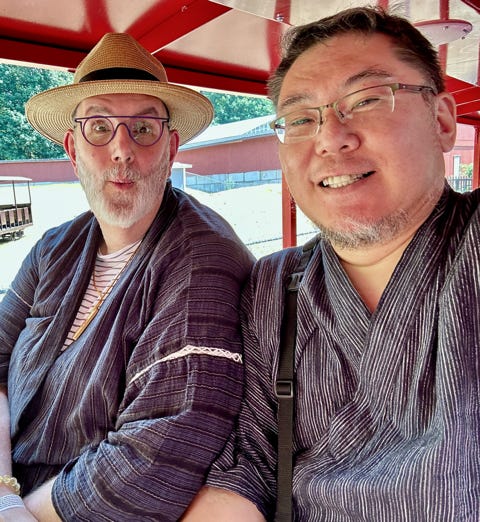The QLP Questionnaire: Brian Watson
"My husband already knows (and has known) about my femme qualities, and I have never needed to butch things up for him. As I explore an enby identity, this is very important."
Email us at queerloveprojectsub@gmail.com to take “The QLP Questionnaire.”
Plus, find out how to submit your original personal essay to The Queer Love Project.
We pay our contributors, so your subscription and support is valuable! Thanks for reading.
I’m Brian Watson. I found my way to the Pacific Northwest after 10 years in Japan, a trip that also introduced me to Hiro, my partner and husband of nearly 32 years. My essays on the intersections of my queerness and Japan have been published in The Audacity’s Emerging Writer series, the Queer Love Project, and TriQuarterly, among other places, and my craft essays appear in Brevity Blog.
An excerpt from my memoir's manuscript, Crying in a Foreign Language, was recently accepted by Stone Canoe for their September issue; that same excerpt earned me a finalist nomination for the 2025 Pacific Northwest Writer’s Association’s Unpublished Book contest (with winners to be announced in September). I was named a finalist in the 2024 Iron Horse Literary Review long-form essay contest and won an honorable mention in the 2024 Writer’s Digest Annual Writing Competition.
I share Out of Japan, my Substack newsletter, with more than 600 subscribers, and review non-fiction for Hippocampus.
What is your age, where in the world do you primarily live, where did you grow up?
I am 59, and I live in a semi-rural suburb of Seattle. I grew up in a suburb of New York City and miss spending weekends in Manhattan as I did during high school.
After four years of college in rural Massachusetts, I took a one-year job at a high school in Japan, in a suburb of Tokyo (what is it with me and suburbs?), and ended up changing jobs until that one year became 10. Since 1998, the Pacific Northwest has claimed me, and my husband and I have lived in even more suburbs of both Seattle and Vancouver, BC.
How do you define yourself on the LGBTQ+ spectrum?
Queer, verging on enby.
What is your relationship status?
Married.
Do you have an “ideal” relationship status?
Right here, right now.
What is the biggest misconception about being single or in a relationship?
They say that it is hard work to make a marriage last, but that hasn't been my experience. Maybe I'm lucky in love—and maybe our few problems seem even smaller in the rear-view mirror—but our experience with flexibility, compromises, and a never-ending sense of humor has allowed us to reconnect and recommit day after day (for 11,630 days as of today).
When was your first intimate moment? Was it with someone you liked? Did you feel pressured into it?
I got my hands on male pornography at an early age, and learned how to cruise other men before I turned 15. True intimacy—sexual experiences that involved both lust *and* love—didn't arrive until I was 22, with someone I had met via a dial-up modem connection. He was the kindest person and never pressured me.
How would you define love? Is it the thing you work at for a long period of time? Or is it the strong feeling you feel for someone right from the beginning for no reason?
Love is the secret smile that lights up your heart. Love is the cup of tea waiting on your desk. Love is the way he comes down the stairs after every shower, ready to perform his nudity as you sit waiting just within eyeshot.
Love is gratitude, gratitude is love. Love is time alone with your passions—writing, art, research—and you look up, wondering how so much time has passed. Love is in the first ray of sunlight each morning, the first drop of longed-for rain, and the kiss of the Moon as she twirls just for you.
Love is in the jokes that only the two of you laugh at. Love is the cracks where grief broke your heart open; the cracks that still shine with softness despite the disappointments and fear; the cracks that still exist even after decades of healing. Love is at the crest of the wave and the pit of the valley as you surf through depression, anxiety, or bipolar disorders.
Love is in each minute you continue, each minute you resist. Love is a yes, a no, a boundary, a now. Love guides your self-exploration, your self-acknowledgment, and your authenticity. Love opens the door for all your escapes, for all your steps forward, for all your new choices. Love is curiosity. Love is honoring your privacy.
Love is the friend, the work spouse, the sibling who waits for your memes, your texts, your phone calls, your laughter. Love never looks away. Love asks for change—whether with patience or righteous anger.
Does the relationship fill your deepest needs for closeness with a person? Or do you prefer not to share every part of yourself?
Yes, my marriage fills my intimacy needs.
When did you come out to family, friends and others for the first time?
I came out to myself, to college friends, and to my mother in rapid succession in 1987. And the comings-out have continued ever since.
Did you have any LGBTQ+ role models as a child or teenager? What do you remember about images of same-gender or queer relationships or messages you gleaned?
No, although I remember when Elton John came out as “bisexual.” I also remember Billy Crystal as Jody on Soap, but despite the epochal change his character represented, it was still homophobic. The advent of AIDS in the early 1980s only intensified the homophobia, but my exposure to gay porn allowed me to mitigate some of my self-hatred.
It wasn't until I started reading authors like Rita Mae Brown, Umberto Eco, Armistead Maupin, Edmund White, Felice Picano, and Ethan Mordden in the mid- to late-’80ss that I felt more whole.
Are there any pivotal pop culture moments that you credit for teaching about love and/or relationships.
There were three movies in the ‘90s—Shirley Valentine, Muriel's Wedding, and Priscilla, Queen of the Desert—that truly resonated with my ideas of love and self-respect.
Do you have a "found family" or "chosen family"?
Oh, yes. Several. College friends, Japan friends, Vancouver friends, and Seattle friends all comprise my various logical families.
What is your relationship with your biological family (if any)?
Good. I think it helps that a) I have a gay sibling, and b) I came out to my extended family in an email blast in 2001. My nuclear family is loving and supportive (my mom, perhaps, too much so), and all of my siblings wrote letters as testimony when my husband applied for his green card. My extended family is another story, but my coming out (and subsequent conversations) have only helped me identify who I do (and do not) want to keep within my life.
What do you (did you) like about dating as a LGBTQ person? What do/did you dislike?
I was a big fan of cruising before I met my husband, but I found dating much more challenging until I finally learned to stop sleeping with people on the first date. I have a hard time imagining that the apps have made dating any easier. For me, IRL events and communities made it better to meet someone with whom I had something in common.
Has race, ethnicity or cultural differences been a factor in who you seek out?
No. I like to say that I might be an ex-Catholic, but I still have catholic tastes in men. Generally speaking, however, racial prejudice among white men is a turn off, and I am always wary around people who either fetishize men or ignore them, based on their perceived racial identity.
Have you had any difficulties dating or finding/keeping a relationship?
No.
What’s the most surprising thing you have learned about relationships from your perspective?
Monogamy = heterosexism. Monogamy denies authenticity. Understanding that your partner and you will both have fantasies and desires that the other cannot fulfill can open you both up to honesty within the relationship.
Have you experienced heartbreak?
Yes, but not from a relationship with a man. My father's death in 1980 broke my heart.
How would you term your sexual relationship with your primary partner? Has that changed over time?
Our current focus is more on intimacy and less on sex. Part of this is due to the length of our relationship and our aging body chemistry. Thankfully, we put a lot of pennies in the proverbial pot during the first five or six years of our relationship, and we have, therefore, also proverbially, yet to remove all of those pennies.
Do you have any moments of joy, happiness or pleasure that you can share about being in a same-gender or queer relationship?
There is something fabulous about a longterm partnership. Knowing one another with 32 years of experience lets you both trust in your authenticity. My husband already knows (and has known) about my femme qualities, and I have never needed to butch things up for him. As I explore an enby identity, this is very important. But also, we know each other well enough to know how to make each other happy, instinctually.
Are there any things that standard heterosexual relationships have that you feel are out of reach or that you wish you had or could achieve?
God, no!
Have you ever been in a polyamorous relationship or would you like to be in a situation that doesn’t involve just two people?
No, and no. I'm too old and too busy to learn how to incorporate a third personality into our lives.
Are you married? Have you ever wanted to be? Can you explain why and what your hopes, dreams and journey has been like.
Yes. But we were together for nearly twenty years before we wed, holding off because we needed there to be federal benefits associated with marriage. My husband is Japanese, and until there was a path to a green card for him, neither of us was truly compelled to get married. We had a committed relationship without a marriage certificate.
Have you had a difficult time navigating the “roles” you should play in a relationship?
Maybe? I naturally gravitate to protectiveness and have had to remind myself many times over the years that my husband does NOT need a parent in me. I'm also the primary income-earner in the relationship, and we have had to be honest about our shared expectations for housework. I've also needed to understand my own internalized heterosexism. Lots of compromises along the way.
What is your philosophy about relationships?
Zen. Abandon your preconceptions. Abandon your expectations. Allow each of you in the relationship to either start from zero or to return to zero, because the only rules that really matter are those that the two of you discover together.
Any good/bad advice you received from a friend or queer elder?
If you don't like any of the identity labels (such as bear, twink, daddy...), create your own. Don't let other people's preconceptions box you in.
Any advice you’d give to someone younger than you who thinks it’s impossible to find love?
You can't "find" love any more than you can "find" happiness. Relax your gaze, abandon your expectations, and stop searching. Spend time doing the things that make you happy (either on your own or in shared-interest groups) and maybe, from out of the corner of your eye, you'll catch a glimpse of love.
BONUS:
We all need more inspiration. Recommend something that influenced or helped shape you significantly that you’d recommend to someone else.
Books: The Dry Season, by Melissa Febos
TV shows: Tokyo Midnight Diner
Movies: Tokyo Godfathers
Song: “Brave,” by Sara Bareilles
Play, Musical, Other Cultural artifact: I always recommend people visit Japan, and I'm an excellent tour guide.








You cried beautifully and strong in every language. Btw, I adore the Japanese philosophies of life. Wabi-Sabi anyone?!
Brian, Really enjoyed finding you. First, had to look up "enby", now I know. Second, your attitude towards what seem like "all things gay" speak very loudly to me. You sound like the kind of person who would make an ideal partner, assuming you would admit there is no such thing as an ideal partner. If we were to have a conversation, I would have to ask, "But what about the bad, the negative, the difficult? You had to have some?" I subscribe to your stack and look forward to reading it. Thanks and fonldy, Michael